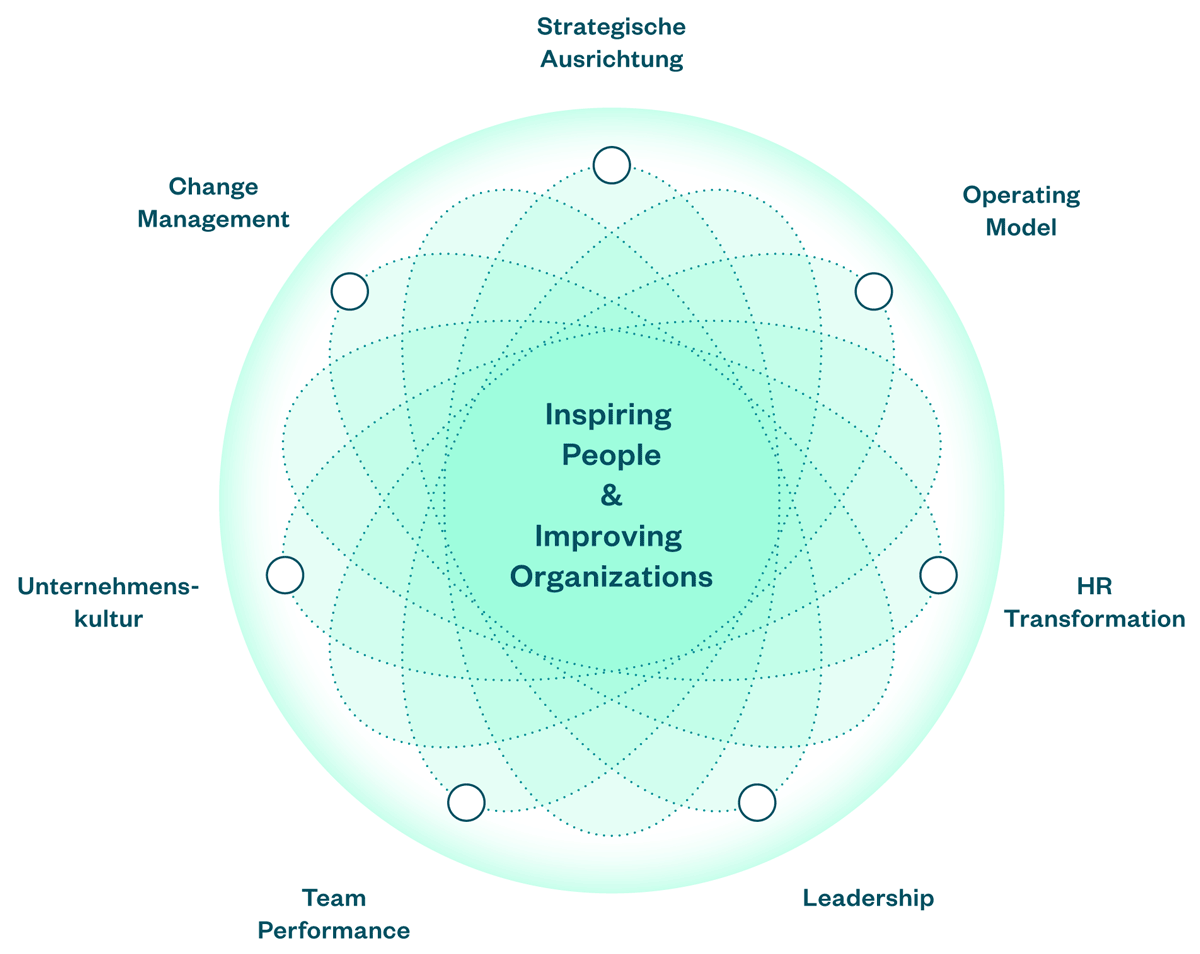
A constructive corporate culture unleashes potential
Corporate culture is an interplay of lived values and experiences that guide the behaviour of employees. Changing it is a complex process that can only be controlled indirectly.
Our approach aims to change both the formal and informal organisation. This has a profound impact on the beliefs of each individual, with changing beliefs manifesting themselves over time in new behaviours and thus shaping the cultural foundation of the organisation.

Challenges and solutions
We support our clients when their corporate culture could be the key to business success - when there are deficits in linking strategic goals with personal commitment across all hierarchical levels, when there are frictional losses and inefficiencies, when you lack the spirit of a committed management team that exemplifies the company's values and inspires employees to perform at their best. Depending on the problem, we work on real, tangible cultural experiences that create an environment that not only attracts employees, but also binds them to the company in the long term. We know how to establish a climate in which openness to change is lived and in which employees see themselves as part of a shared, larger vision. We use proven methods and tools to develop customised solutions for our clients.
Examples from our consulting practice
If you would like to support your managers in shaping your corporate culture as a key element of business success, we should talk to you. Together we can discuss how we can positively and effectively influence the culture of your organisation with a holistic approach, a clear focus on implementation and efficiency.
Our experts look forward to hearing from you!
Make corporate culture the driver of your business success
In today's business world, corporate culture is not just a factor of success - it is the foundation on which long-term success is built. It acts as a powerful driver of business success by linking strategic goals with personal commitment across all hierarchical levels.
A strong culture is the invisible bond that holds together a cohesive management team that not only pulls together, but also exemplifies the company's values and inspires employees to perform at their best.
Genuine, tangible cultural experiences spark enthusiasm and create an environment that not only attracts employees, but also binds them to the company in the long term. They revitalise cooperation and increase the motivation and therefore the performance of employees.
A consciously designed and cultivated corporate culture establishes a climate in which innovation is lived and in which employees see themselves as part of a shared, larger vision.
CLIENT VOICE
"We carried out a global and very successful project with undconsorten to transform our leadership culture - our benchmark project in HR to date. We have experienced highly competent and committed partners. The cooperation was always constructive and trusting. It was fun, anytime again!"
Patrick Wilhelmi
Head of Leadership, Recruiting and Talent Management

Positive corporate culture: the recipe for success
Corporate culture cannot be controlled directly and can only be influenced indirectly by changing beliefs, norms and experiences. With customised solutions and strategies and a holistic understanding of the subtle mechanisms that influence corporate culture, we support our clients on their way to developing a constructive, future-oriented corporate culture.
Unifying values
A strong foundation of shared values and convictions is the key to a successful corporate culture. Values not only create identity, they also define how your employees interact with each other. We work closely with your management to make the implicit values of your organisation explicit. In doing so, we ensure that your corporate culture is aligned with both the individual needs of your employees and the strategic goals of the organisation.
What values define your organisation? How does the common core of your culture become visible in your daily actions?
Culture renewal
In dynamic times, it can happen that fundamental values and principles are pushed into the background. Our approach aims to bring these essential elements of your corporate culture back to the fore and strengthen them. We help you to revitalise and strengthen the existing culture, whether by refreshing the values or adapting them to new framework conditions. By revitalising existing values and cultural elements, we create a renewed sense of belonging and motivation among your employees.
How can you ensure that your corporate culture remains present and vibrant even in times of change? What steps do you need to take to revitalise your company's core values? How do you strengthen your culture in the hybrid working world?
Cultural transformation
Sometimes profound changes are necessary to create a culture that finds short-term answers to business challenges and supports long-term business success. Our comprehensive culture diagnosis and development projects enable a tangible improvement in corporate culture. We recognise and address the key elements to create a culture that not only responds to current needs but also anticipates future developments.
How can you create a culture that not only inspires but also contributes to business success and strategy? How can a future-orientated corporate culture contribute to overcoming future challenges?
Investing in digitalisation
In today's world, digitalisation plays a central role in shaping and spreading a positive corporate culture. Technology serves as a culture driver by providing digital tools that effectively support cultural work and facilitate the establishment of a managed corporate culture. By using specialised platforms and communication tools, the company's values and standards can be communicated and lived by all employees. In addition, the development of digital cultural initiatives enables an innovative and interactive type of cultural work that actively involves and motivates employees. These initiatives can range from virtual team building events to digital learning platforms that promote continuous learning and the development of corporate culture.
In addition to the introduction of technologies, it is also important to comprehensively accompany the digital transformation and understand how it affects the corporate culture. Consciously shaping the digital transformation enables companies to take advantage of the opportunities offered by digitalisation while cultivating a culture that supports innovation, collaboration and continuous improvement.
Frequently asked questions about positive corporate culture
Do you have any questions or are you interested in exploring a possible collaboration with undconsorten? Get in touch with us - we will help you further.







